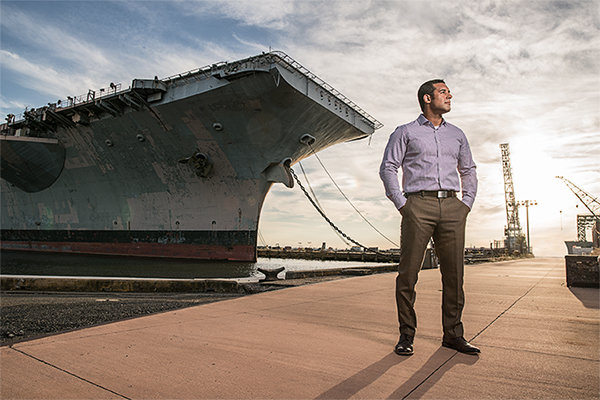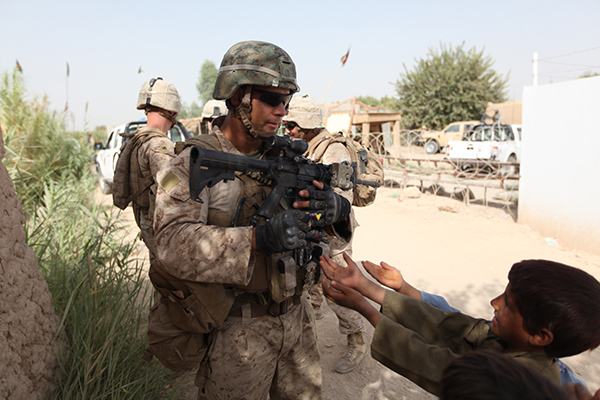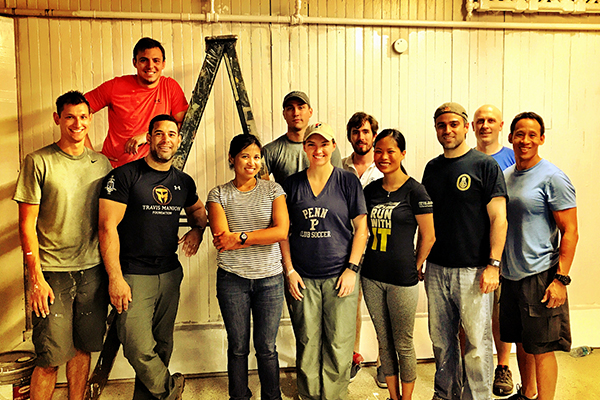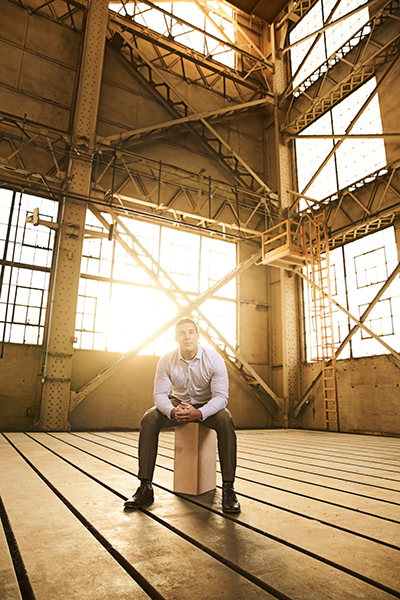Battle Tested
By Tim Hyland
 Photo by Jared Castaldi
Photo by Jared Castaldi
January 17, 2018
Like many of his fellow Americans, Chris Diaz was profoundly affected by the tragic events of September 11, 2001. Quite simply, he says, it was the day that forever changed the trajectory of his life.
“On that Tuesday morning, I felt moved to join the military,” recalls the New York native. “And yet, at the same time, I had a newborn son and felt that I couldn’t leave, at least not right at that time.”
And so he waited. He spent the next few years helping to raise his young child, and then, just after turning 25, he fulfilled what he considered his obligation to his country and enlisted in the United States Navy.
That decision began a journey that would see Diaz travel the world as a Navy flight specialist and thrust him onto the front lines in Afghanistan as a corpsman, fundamentally changing his worldview and ultimately driving him toward a career that, back in 2001, he never would have imagined — working his way toward a PhD in psychology at Drexel, with aspirations of helping veterans, athletes and others.
 Diaz gives a piece of candy to a local boy while on patrol to discuss quality
of life with Afghans in Marjah, Afghanistan.
Diaz gives a piece of candy to a local boy while on patrol to discuss quality
of life with Afghans in Marjah, Afghanistan.
Diaz originally enlisted with the idea that he would “jump out of airplanes and go after bad guys,” but he found out during boot camp that he was legally blind in his left eye, which took some of the military’s special programs off the table.
Instead, he found himself assigned to an aircraft carrier, where he served as aviation boatswain’s mate, charged with coordinating airspace and helping to manage all activities on the flight deck. His time aboard the ship offered a new and more expansive perspective of his place in the world, and of his responsibility to others.
“The experience of living on a floating city with 5,000 other people is unique,” he says. “You learn how insignificant you are when you’re floating around in the ocean for months and months at a time. You get placed in this artificial environment, with people from all over the country, and you have to learn to work together toward a common purpose.”
It was during the rare moments when Diaz wasn’t on duty that he discovered what would become two life passions: the field of psychology, through an introductory college course, and Brazilian jiu-jitsu, a form of martial art that helped Diaz maintain focus and sharpen his mind during the long months away from his family. He discovered the latter almost by accident, after hearing that an officer was teaching a class. And though Diaz was a complete novice, he took to it almost immediately.
“Many people view martial arts as violence,” he says. “But it couldn’t be further from that. What jiu-jitsu did for me was help me connect my body and my mind. The mental discipline that is required tied in very closely with my developing passion for psychology.”
His immersion into both of these worlds — both so tightly focused on the power of the mind, and the mind’s power over us — pushed him for the first time to contemplate a career as a sport psychologist. Indeed, as his second tour ended, he fully intended to leave the military, his obligation met, and enroll as a full-time psychology student at Drexel.
We are people of action who have a demonstrated track record of utilizing our skills and relationships to get things done.
That plan changed, however, when a Navy chief asked Diaz to reconsider. If he truly wanted to pursue a career in psychology, the chief said, a new experience as a Navy medical corpsman — working as a medic on the front lines of our nation’s most vicious arenas of war — might prove to be of enormous value. After consulting with his family, and weighing the risks associated with another tour during wartime, Diaz agreed. He remained in the military, this time in a front-line role, and was eventually sent to Afghanistan.
Just as his chief had suggested, the experience was transformative. He found himself in combat for the first time, supporting his fellow Marines — responsible for their lives — in the most difficult conditions imaginable.
“Nothing can prepare you for the experience of combat,” Diaz says. “It’s a test that so few people actually experience: When things start going sideways, you really don’t know how you’ll actually respond, what type of person you’ll actually be. But now, having been tested in that way, I can move forward with an incredible amount of confidence, knowing who I am at my deepest core. When people were relying on me, and when my life was being threatened, I knew how to respond.”
When his third and last tour ended, Diaz finally did move on, enrolling in Drexel’s undergraduate psychology program. As a junior, he became the University’s first Pat Tillman Scholar — a national honor that provides support for high-achieving military veterans. He also delved headlong into research, becoming a key member of the Nezu Stress and Coping Research Lab, working under Professors Arthur Nezu, PhD, and Christine Maguth Nezu, PhD.
 Diaz and members of his nonprofit, Action Tank, volunteer at Prevention Point, a harm-reduction program in the Kensington neighborhood of Philadelphia.
Diaz and members of his nonprofit, Action Tank, volunteer at Prevention Point, a harm-reduction program in the Kensington neighborhood of Philadelphia.
His career goal, broadly speaking, is to develop and employ effective methodologies to help athletes and high performers achieve more than they could ever dream, and to help veterans fulfill their life’s ambition, even after enduring the trials of wartime.
Now pursuing his PhD in clinical psychology at Drexel, Diaz continues to work in the Nezu lab, exploring the use of problem-solving therapy to treat chronically ill populations, including veterans and active service members.
“There are a whole host of issues facing our serving members, veterans and families,” Diaz says. “We aim to give people the skills to better cope with stress and overcome psychological difficulties.”
The lab is focused on battling a range of issues, from suicidal ideation to substance abuse, and also trains clinicians to better understand the experience of military life.
“I believe that in all of our lives there’s a thread that ties our experiences together in some way — that there’s an interconnectedness to those experiences,” Diaz says. “If I had not had my time in the military, I would not be able to speak about these issues. There aren’t many combat veterans walking around at Drexel pursuing their PhD in clinical psychology. So, to be able to teach my colleagues and share this knowledge, it feels like that thread has finally been tied.”
His work with veterans doesn’t end there, however. In the spring of 2017, he helped launch a nonprofit coalition called Action Tank, which brings local military veterans together to take on civic and social problems. The aim, Diaz says, is two-fold: to make a positive impact on the city, while also changing the way society looks at veterans. Too often, he says, veterans are considered damaged in some way, or vulnerable. It’s an unfair stereotype, and one that Action Tank intends to dismantle.
“We are people of action who have a demonstrated track record of utilizing our skills and relationships to get things done,” he says. “Now we’re putting those ambitions in the service of others.”
 Photo by Jared Castaldi
Photo by Jared Castaldi
Diaz is also extending his service and knowledge to Drexel’s student athletes. Through a partnership with the University’s Department of Athletics, he has played a key role in launching the Drexel Performance Center, where he and a multidisciplinary team of specialists are helping athletes tackle the mental side of sports. Diaz says his time in the Navy and experience with jiu-jitsu have convinced him that it is often our brains, and not our bodies, that stand in the way of athletic achievement. With the proper coaching and skills, those mental blocks can be overcome.
“We have the unique opportunity here to serve Drexel athletes, and that’s something I am incredibly passionate about,” he says. “This multidisciplinary team can help our students understand and define their psychology and succeed in life far beyond the academic and athletic settings.”
His new initiatives both on campus and off are not small undertakings, and given that Diaz already has so much on his plate — his ongoing work toward his PhD, his research in the Nezu lab, his family at home, not to mention the occasional adventure like climbing Mount Kilimanjaro — one might wonder why he would take it all on.
For Diaz, though, the answer is simple: The only moment that’s guaranteed is the present, and he intends to make the most of it — by helping as many people as possible.
“I don’t see ‘work,’ ‘school’ and ‘home’ as separate, as I think a lot of people do,” Diaz says. “I see them as one, joined by the same purpose. And I think that allows me to be involved in so much, because I know it’s all connected. When you know your purpose, when your goals are aligned, it all flows together. I know my purpose is to use my skills in the service of others.”